‘Frogs’ and ‘Geckos’: Syria’s Jihadists Speak the Language of Rebellion
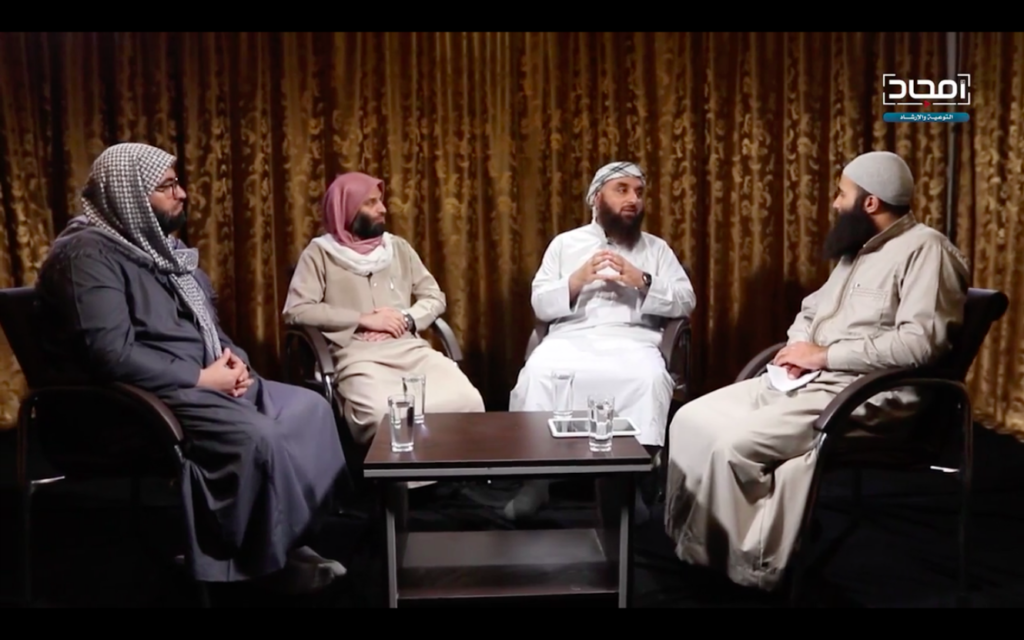
A Turkish-Russian agreement last month forestalled a potentially disastrous Syrian military attack on the country’s northwestern Idlib governorate, the Syrian opposition’s last major stronghold. Yet the agreement also required Turkey to “remove” the Syrian jihadist group Hayat Tahrir al-Sham and other hardliners from much of the northwest, a possible first step toward separating them from the rest of the opposition. So far, results are reportedly mixed. Whether the group continues to comply, and how it resolves its own dual transnational-local identity, could be a matter of life or death for the northwest’s nearly three million residents.
A recent video release from Tahrir al-Sham, or HTS, helps show how it has integrated into Syria’s opposition, and how it translates its ideological worldview into the language of Syria’s war. The Sept. 17 video features a roundtable discussion between three of the group’s top leaders and members of its advisory Shari’a Council as they expound on what the Syrian government calls “reconciliation” — the negotiated surrender of opposition-held areas. As they do so, they also engage in a seemingly unscripted discussion of politics, war, and religious law. And they repeatedly touch on language, and how the vocabulary of Syria’s war corresponds to their particular religious-jurisprudential lexicon.
For a group that has been designated a terrorist organization internationally, HTS’s integration into the Syrian rebellion is key to its survival. A group that is flush with its Syrian opposition surroundings is one that cannot be easily isolated and destroyed. HTS’s fusion of jihadist and Syrian rebel rhetoric, on display in its recent video, evidences the group’s duality. It is also part of how the group frustrates attempts to separate it from its Syrian context, by policing opposition discourse and deterring Syria’s other rebels from turning against it.
De-Marbling and Reconciliation
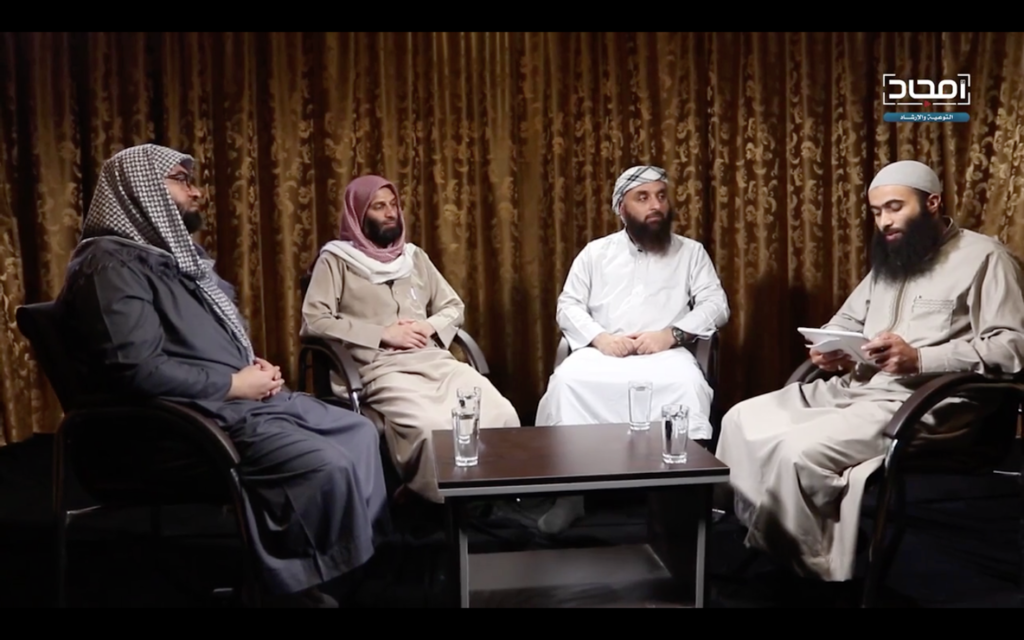
HTS’s roundtable, from left: Mudhar al-Weis, Abdurrahim Attoun, and Abu al-Fateh al-Farghali, along with an unidentified host.
Turkey and Russia’s September deal is just the latest in a series of international agreements that have excluded Syria’s jihadists, and thus aimed to isolate them.
Since HTS first joined Syria’s civil war — originally as “Jabhat al-Nusra,” which later declared itself Syria’s al-Qaeda affiliate — it has protected itself from foreign enemies by embedding in the more palatable parts of the Syrian opposition. The United States and the opposition’s other backers endeavored unsuccessfully to “de-marble” Syria’s opposition and separate the rebels they could comfortably support from the jihadists they feared. One such attempt in 2016 seems to have prompted Jabhat al-Nusra to begin shape-shifting. The group announced the first of several re-brandings and a split with al-Qaeda that was initially false but, since the group evolved into HTS in 2017, has almost certainly become real.
Moscow has repeatedly complained about Washington’s failure to “disassociate” HTS from the opposition. Now, as part of Russia’s September agreement with Turkey, reached in the Russian Black Sea resort Sochi, it has upped the pressure on Turkey to deliver where the United States could not. The Sochi agreement averted a military offensive on Idlib that clearly would have come at a terrible cost. But the agreement is not necessarily good for everyone. Its provisions, including the “removal” of “all radical terrorist groups” from a demilitarized buffer inside Idlib, seem designed to drive a wedge between hardliners like HTS and their non-jihadist comrades and neighbors.
HTS’s video is billed as the first episode of the series “The Dialogue,” titled “‘Reconciliations’ in the Balance of Shari’a (Islamic law)”. HTS leaders Mudhar al-Weis, Abdurrahim Attoun (“Abu Abdullah al-Shami”) and Yehya al-Farghali (“Abu al-Fateh al-Farghali,” an Egyptian) recorded the roundtable as Syria’s northwest was bracing for attack. The video was released, apparently coincidentally, as Moscow and Ankara announced the Sochi deal.
The “reconciliation” these three HTS officials discuss is one of the few successful ways the opposition has been “de-marbled,” albeit by the Syrian government, not the opposition’s friends. “Reconciliation” (musalaha) is Damascus’s euphemistic term for the negotiated surrender of formerly restive communities, their vertical “reconciliation” upwards with the Syrian state and system. Critically for HTS, “reconciliation” deals have typically involved the evacuation of jihadists and others deemed irreconcilable to rebel-held territory elsewhere, mostly Idlib. These bus convoys north have excised jihadists from their social base and helped turn Idlib into Syria’s most intense concentration of jihadists, as well as a haven for millions of vulnerable civilians.
Damascus’s version of “reconciliation” has always excluded HTS and other jihadists. The group has thus been on guard for “reconciliation” in Syria’s northwest, particularly after seeing rebels accede to these deals in Syria’s center and south earlier this year. HTS and other rebels have arrested local figures suspected of dealing with Damascus. The group sees the need to frustrate attempts by the Syrian government and Russia to broker local settlements that could turn Idlib’s residents against HTS and deputize them in a Syrian military advance.
“Call Things by Their Names”
“The Syrian arena and the Syrian jihad are a profound experience, a broad course,” says the video’s host in his introduction, “in which events have taken place that are historical, and that we have to consider at length.”
“Arena” (saha) here refers to a single battlefield in what jihadists consider a rolling, global war. But these HTS officials are focused on Syria, and on how to describe and understand it. All three are keen to emphasize that “reconciliation” is a rhetorical ploy. And they are themselves acutely attuned to the importance of language and discourse.
What Damascus’s “reconciliation” really means, says Abu al-Fateh Farghali, is in fact “betrayal.” Farghali refers to reconciliation along these lines as “this deformed entity, this dead fetus … this monstrosity.” He continues, “As God’s Prophet, peace be upon him, told us, ‘there will come people ‘who call wine by other than its name,’ in order to thus make it permissible.” His comrade Mudhar al-Weis, meanwhile, says the word is just a continuation of a “war of terminology,” which he calls “an old war on Islam and Muslims.” “Jihad” and “revolution” are branded as “terror” and “rebellion,” he says, while “betrayal” is called a “truce” or “reconciliation.” “Really, we need to call things by their names,” says Weis.
It is these HTS figures’ other linguistic points that give deeper insight into their thinking. The way Weis, for example, speaks at length about “munafiqoun” (hypocrites) shows the extent of his suspicion of much of the non-jihadist opposition around him:
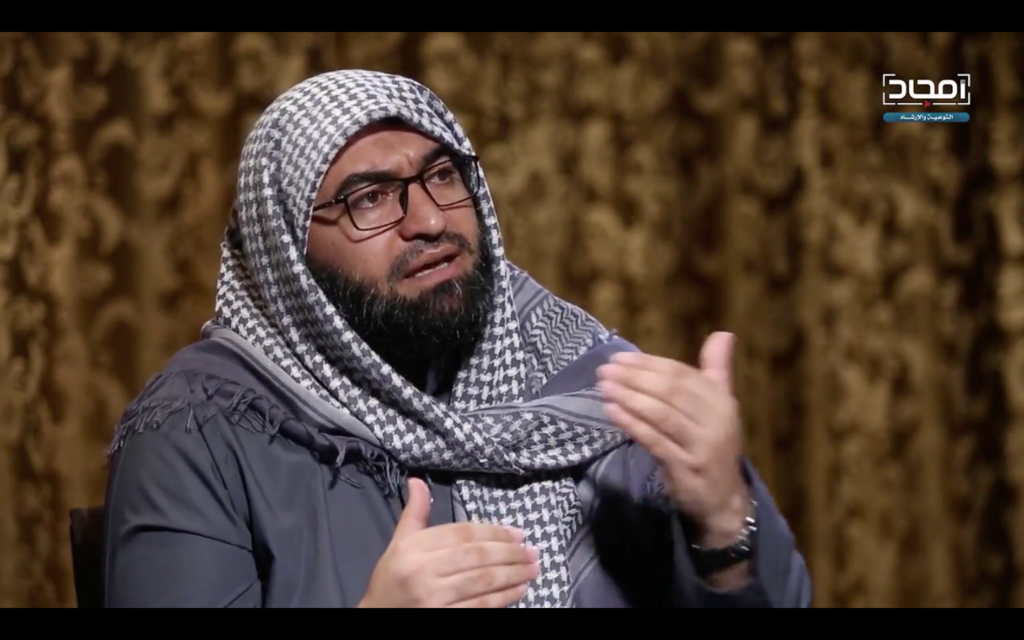
Weis relates fair-weather supporters of Syria’s uprising to “munafiqoun” (hypocrites).
Of course, these [international] political tracks led to many of these [rebel] commanders being mortgaged, many of these factions, so the soil became ready, really, for what happened in the end. A disease got in, one mentioned in the Quran, and among the most dangerous of diseases. In the introduction of Sourat al-Baqarah, there are five verses about the believers and two about the infidels, but tens of verses about the munafiqeen. There’s an entire Sourah called “al-Munafiqoun.” These munafiqoun remain within Muslim ranks, undercover, vacillating. When there’s weakness in Muslim ranks, these forms and types appear to play their destructive role. That’s why Almighty God, how did He describe them? He said, “They are the enemy, so beware of them. May God destroy them! How they are deluded (63:4).” That is, “When you see them, their forms please you, and when they speak, you listen to their words (63:4).” They say, “Raise the flag of your revolution,” but in the end, they raised the flag of the regime. They said, “Dara’a won’t fall,” or [the] Houran [plain], “and Moscow will fall instead.” But we’re surprised the next day that …”
Another participant jumps in: “[They’re] the first ones to jump into the regime’s embrace.”
Weis responds, “That’s why, in reality, they’re the enemy. We need to call these things by their names. They are munafiqoun. We need to label them as God Almighty did.”
“Let Moscow fall, Dara’a won’t,” was reportedly what a rebel commander in Syria’s southern Dara’a governorate defiantly told Russians in June 2018 negotiations. Only days later, he and other “Southern Front” rebels acceded to a negotiated surrender, under withering Syrian and Russian military pressure. The Southern Front’s factions had been favored recipients of foreign support, and had publicly distanced themselves from Jabhat al-Nusra accordingly. Weis seems nonplussed by the Southern Front’s abbreviated resistance.
His reference to “Raise the flag of your revolution” is even more revealing. The slogan began as a hashtag in March 2015, as Syrian opposition protesters embraced the opposition’s tricolor flag in an implicit challenge to jihadists and their black Islamic banners. The opposition flag remained a point of contention between the opposition’s so-called “revolutionary” and more hardline Islamist wings for years. Weis is apparently conflating those non-jihadist oppositionists who rallied around the revolutionary flag to reclaim symbolic leadership of Syria’s opposition with former opposition members who surrendered and “reconciled” with the Syrian government. His reference seemingly betrays a view that those who challenged jihadists are in fact a fifth column in waiting.
Weis had been one of the leaders of Jabhat al-Nusra’s eastern branch, in Syria’s Deir al-Zour governorate. Weis, himself from Deir al-Zour, had headed the Jabhat al-Nusra judicial-administrative body that helped manage the governorate. As the Islamic State closed in on eastern rebels in 2014, local Jabhat al-Nusra took the extraordinary eleventh-hour step of combining with other Deir al-Zour rebels to form the “Mujahideen Shura Council.” It was Weis who announced the move. In 2014, Weis and eastern Jabhat al-Nusra were integrated into Deir al-Zour’s opposition to a degree probably unparalleled by the group before or since — at least until the Islamic State scattered seized Deir al-Zour and scattered its rebels across the country.
Now, in an indication of how Weis and HTS’s view of Syria’s opposition has since darkened, Weis sees “munafiqoun” everywhere. His suspicion highlights one of the central contradictions of HTS’s relationship with the Syrian opposition around it: Even as they claim to lead it, they fundamentally do not trust it. They are keen not to be extricated from the surrounding opposition, yet they see internal enemies all around them.
Defying Categorization
These HTS leaders are preoccupied with classifying the Syrian opposition around them, according to their own ideological frame of reference. By dividing the opposition into categories like “hypocrites,” “apostates,” or the civilian “oppressed,” and by analogizing between Islamic texts and their own fluid, modern surroundings, they can translate Islamic jurisprudence into practical guidance. Yet they themselves defy easy categorization, as they blend local rebellion and jihadism in terms of their worldview, or even their biographies.
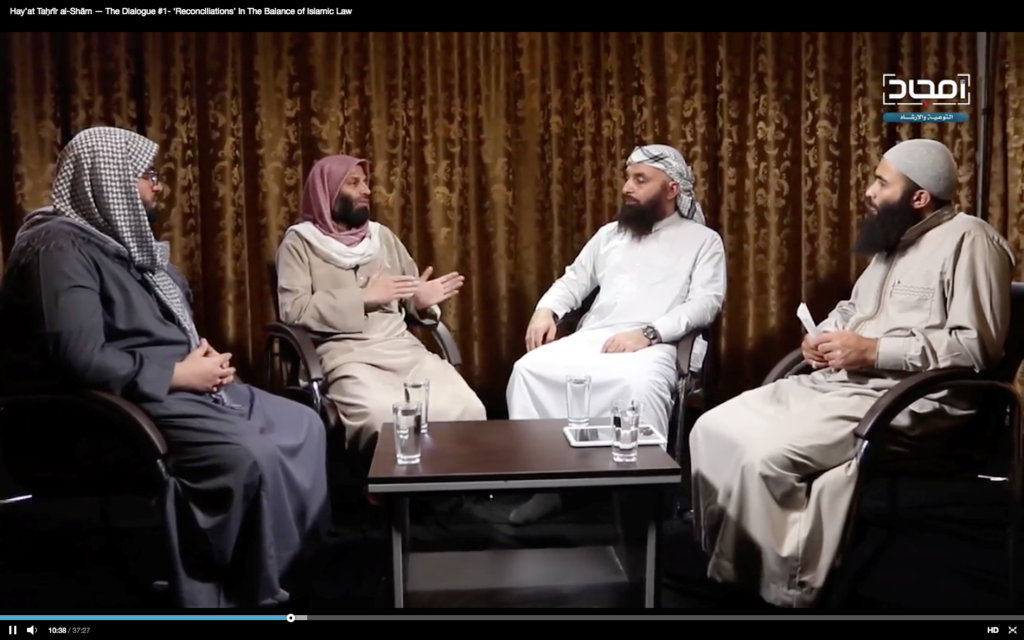
Attoun (second from left) lays out rulings on civilians and the “mustad’afin” (weak, oppressed).
Abdurrahim Attoun returns to the theme of “munafiqoun” and “nifaq” (hypocrisy) in discussing how HTS officials categorize and sub-categorize opposition fighters and civilians. On rebel fighters, Attoun says those who cooperate with reconciliations must be fought in all instances. Any former rebels who actively join Syrian military ranks, moreover, are guilty of apostasy from Islam and must be killed “without honor.” As for “the rest of the Muslim public, what’s called in modern terminology ‘civilians,’” he distinguishes between those who are “mustad’afin” (weak, oppressed) and those who are not. The mustad’afin upon whom “reconciliations” are imposed are absolved of any responsibility, he says. Local civilian notables who facilitate “reconciliations,” on the other hand, are munafiqoun — the enemy. “Their name in religion is ‘heads of nifaq,’” Attoun says.
Attoun is one of HTS’s most prominent public-facing officials, and frequently its main spokesperson in place of HTS head “Abu Muhammad al-Jolani.” He sat at Jolani’s side as the latter announced the group’s ostensible break with al-Qaeda in 2016. He may be the HTS figure most conspicuously embroiled in HTS’s intra-jihadist controversies, getting into acrimonious public arguments with the Islamic State’s spokesman in 2014 and with al-Qaeda’s top leadership late last year.
Attoun is also a local. He is reportedly Idlibi, and, like Weis, a “graduate” of Syria’s notorious Seidnaya Prison. His brother “Abu al-Kheir” was among the first-tier leadership of mostly Syrian group Ahrar al-Sham. He is Syrian, personally, even as he is also HTS’s champion in a globe-spanning jihadist debate.
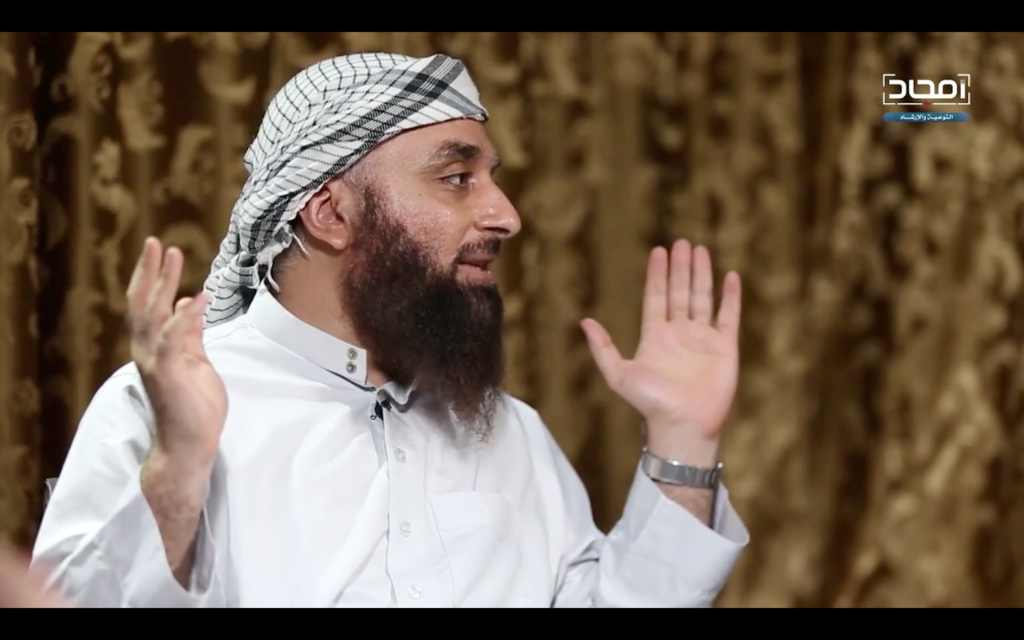
Farghali interrogates the definition of “mustad’af.”
The Egyptian Farghali, on the other hand, is obviously not a local. The video’s moderator, playing devil’s advocate, asks Farghali about those inclined to be lenient with local rebels who “reconcile.” “The local reality just imposes this on many people,” he poses rhetorically, and any deal is forced on members of “fasil al-balad” (the hometown rebel faction) who are bound up in local communal ties.
Farghali returns to Attoun’s definition of “mustad’af” to emphasize that jihadists’ sympathy has limits. “A mustad’af is an elderly man who can’t participate in jihad, a woman, a child,” says Farghali. “Not a man who’s capable of, what? Of fighting.” Someone who can go to war is mandated — as an individual, not a member of some local faction — “to fight on God’s path.” “As for someone mustad’af who goes out and fights alongside the regime, that’s not mustad’af,” he says. “And as for someone mustad’af who goes out and prevents the mujahideen from carrying out jihad, a lion with them and an ostrich with the regime, he’s not mustad’af. Islam doesn’t accept that, nor does reason, nor does religion or logic.”
Here Farghali relates the idea of a blameless “mustad’af” to, in the host’s words, “fasil al-balad,” itself a nod to the basically organic and local character of Syria’s insurgency. HTS and some other factions have a specific and defined ideological character — a commitment to establishing a particular vision of Islamic rule through violence, a struggle that, even as it may be waged in Syria, is borderless in conception and rejects the international order. Most of Syria’s rebels, on the other hand, are a sort of militarized expression of their local communities. To the extent they have a program, it seems to be “revolution” generally, and bringing down the Syrian government of Bashar al-Assad. Yet as their homes and communities, to which they are inextricably linked, have fallen back under government control, many have laid down their arms or rejoined the Syrian military.
By one account, Farghali is a longtime jihadist who was jailed in Egypt’s similarly notorious Aqrab prison from 2002 to 2011. After arriving in Syria in 2012, he and several other Egyptians formed a hardline lobby inside Ahrar al-Sham. They eventually left Ahrar for HTS, becoming some of its most high-profile media personalities. Farghali — not only ideologically distinct from most local fighters, but a genuine alien, a non-Syrian — insists on holding Syrian rebels to the same uncompromising standard to which these HTS officials hold themselves. Yet that is a standard that is likely impossible for those who, even after years of war, are still fighting for their towns and families, and who haven’t devoted their lives to itinerant militancy as Farghali and his comrades have.
These jihadists’ local embeddedness makes it more difficult to isolate and eliminate them. Yet it also means they are surrounded by fighters who are vulnerable to communal pressures to surrender and “reconcile.”
“Frogs” and “Geckos”
Of course, these HTS figures’ jihadist pedigrees do not mean they are wholly distinct from the broader Syrian opposition milieu. Mudhar al-Weis’s references to opposition slogans show how he and others are in dialogue with the opposition around them. But the best example of how the three engage with opposition discourse is their joking riff on a novel piece of Syrian opposition slang: “frogs.”
Since the fall of Damascus’s rebel-held East Ghouta suburbs, the term “frog” (difda’) has become widespread in opposition circles, after an East Ghouta sheikh named Bassam Difda’ who rallied locals in his rebel-held town to aid the Syrian military’s advance. Now it is used to describe individuals within opposition communities who, when the opportunity presents itself, will “jump” to the government side.
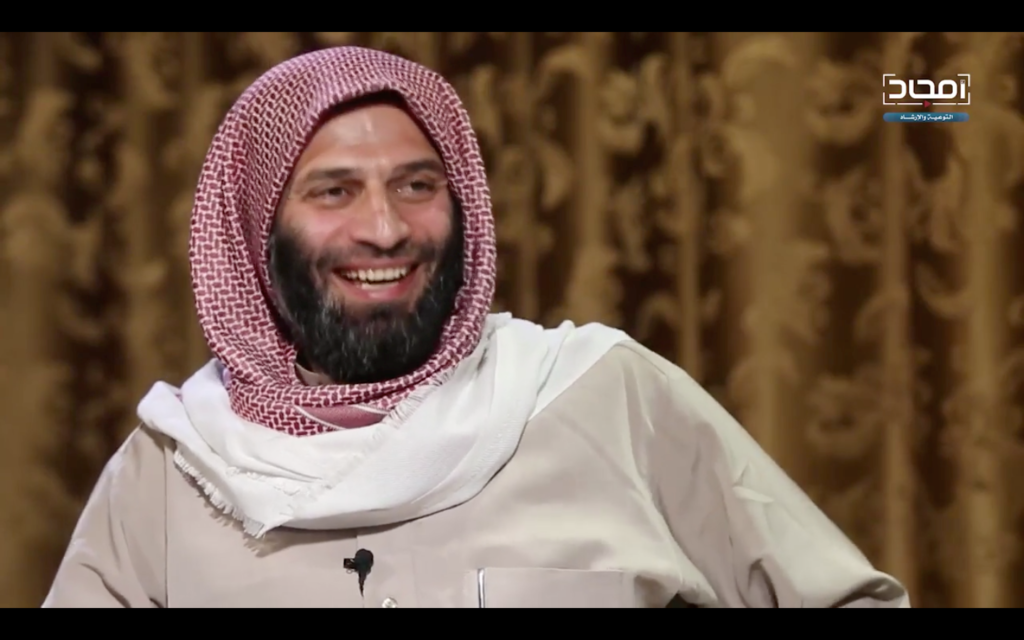
Attoun laughs as he discusses ‘frogs.’
Attoun: “Just in this context, we can recall a term that spread lately — ‘frogs.’ (laughs) ‘Frogs,’ as a popular term, or a revolutionary term, there’s nothing wrong with it. As for a religious term, it’s according to the way we explained it. That is, there are frogs who jumped to join the regime, and there are frogs who reconciled with the regime … ”
Host: “So if someone says the ruling on someone is that he’s a ‘frog,’ that’s not enough.”
Attoun (laughing): “That’s not a religious ruling … ”
Weis: “On the subject of frogs: Really, we insult this creature, when we attribute to it these traitors. A frog is among the creatures that glorify God, and we’ve been discouraged from killing it, because it put out the fire on Abraham. As for those people: Really, they’re geckos.”
Host: “Right. Right.”
Farghali: “That’s a new term.”
Weis: “And the gecko … So we call things by their names, and in their right place.”
These HTS officials’ amused use of “frog” is a reminder that, while these veteran jihadists are invested in their own insular references and debates, they are also part of the opposition’s communities and culture, including its in-jokes and slang. Their rank-and-file soldiers — who grew up inside Syria’s rebellion, not international militancy — may be even more integrated into their surroundings. (On geckos: Weis is presumably alluding to the Prophet Muhammad calling geckos “vermin.”)
The video, then, emphasizes Syrian jihadists’ diglossia: They speak the language of jihadism and the language of revolution, and they understand how to translate back and forth.
Whether HTS is, at base, Syrian or not is a question with huge practical and political significance. The Syrian government characterizes its “terrorist” enemies as essentially foreign. They came through Turkey, Foreign Minister Walid al-Moallem has said, and they will leave through Turkey. Turkey, meanwhile, argues that the number of truly hopeless radicals is much smaller, and that sections of HTS are Syrian, pragmatic, and potentially salvageable. If they are considered Syrian, then arguably they need to be part of a final Syrian settlement and a reconstituted Syrian society. If they are aliens, as Damascus insists, the solution may be expulsion or death.
For its part, HTS insists it will not go down without a fight. In the video — again, recorded before the Sochi deal — its leaders say they absolutely refuse to lay down arms. They are prepared to resist, they say, and Idlib’s people are with them. In closing, Weis tells his “mujahideen brothers” they are at “a historic, decisive moment.” “The Islamic nation expects much from you, so be up to that responsibility and that mission laid on your shoulders,” he says. “As for our [Syrian] people, we say to you, rely on God, and hold fast to him. Trust God Almighty, then trust in your mujahideen brothers and sons.’” In an Oct. 14 statement, HTS tacitly endorsed the Sochi agreement’s terms. Yet it also reiterated it would never renounce jihad or disarm.
Now, as Turkey endeavors to fully implement the Sochi agreement and save Syria’s northwest from a catastrophic military showdown, HTS’s dual nature is part of why Turkey may have a difficult time. HTS’s integral relationship with Syria’s opposition could make it impossible to isolate the jihadists — or, conversely, it could give the Turks the opening they need to engage and demobilize parts of the group.
Whether HTS’s own intertwined identities allow it to be untangled from the opposition may be what decides Idlib’s future.
Sam Heller is International Crisis Group’s Senior Analyst on Non-State Armed Groups, as part of the organization’s work on Jihad in Modern Conflict. He has researched and written about the Syrian war since 2013 and is based in Beirut. Follow Sam on Twitter: @AbuJamajem.

